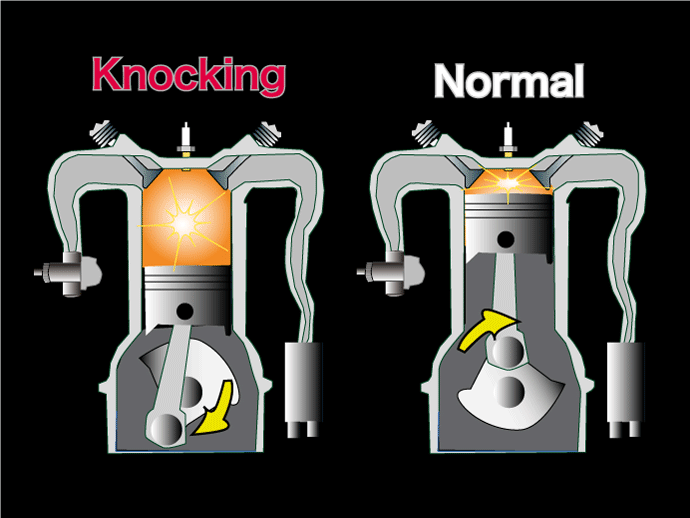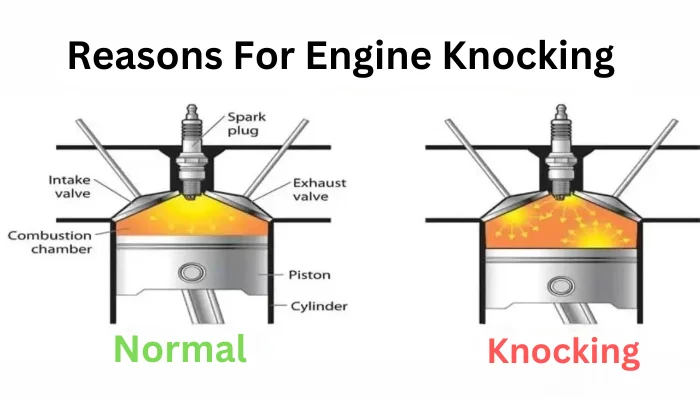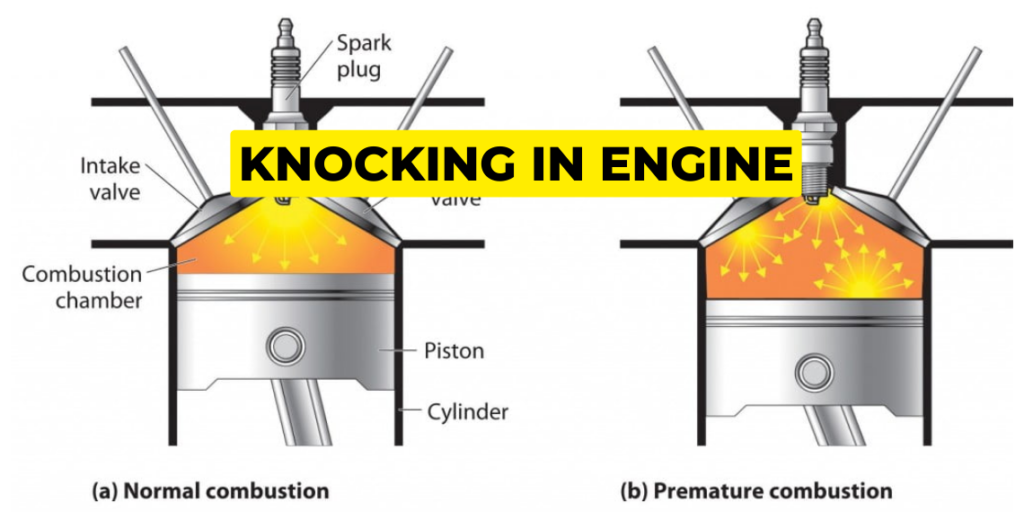In this section, we will delve into the concept of engine knock, also known as detonation or spark knock, which can be a sign of a bigger problem within your vehicle’s engine. If left unaddressed, engine knock can result in severe damage to your engine, resulting in expensive repairs. So, what exactly is engine knock, and how can you identify it?
Engine knock is a knocking or tapping sound emanating from your engine, usually resembling a metallic ping or a knocking noise. The sound is caused by the fuel within your engine prematurely detonating before the spark plug ignites it, resulting in an incorrect spark timing. This can cause irregular combustion, resulting in damage to your engine’s pistons and other components.
If you hear a knocking or tapping sound from your engine, it is important that you take action immediately to diagnose and address the issue. Failure to do so can result in significant damage and costly repairs. In the next section, we will explore the symptoms of engine knock that you should be aware of, so you can take preventative measures to avoid this issue.

Recognizing Engine Knock Symptoms
If you’ve ever heard an unusual knocking or tapping sound coming from your vehicle’s engine, you might be familiar with the concept of engine knock. So, what does engine knock sound like?
The sound of engine knock can vary depending on the vehicle, but it is typically a metallic knocking noise that is more pronounced when the engine is under load or acceleration. Some describe it as a rattling sound, while others compare it to marbles or rocks bouncing around inside the engine.
If you suspect engine knock, it’s important to address the issue promptly to avoid potential damage to your engine. In addition to the sound, there are other engine knock sensor symptoms to watch out for:
- Reduced engine performance
- Increased fuel consumption
- Check engine light illuminated
- Engine misfire
If you experience any of these symptoms, it’s essential to have your vehicle inspected by a qualified mechanic to determine the root cause of the problem. Some causes of engine knock can be addressed with simple maintenance, while others may require more extensive repairs.
Reasons For Engine Knocking
Engine knock can be caused by a variety of factors, such as using low-quality fuel, excessive heat, carbon build-up, incorrect ignition timing, and more. Let’s take a closer look at these engine knock causes.
One of the most common causes of engine knock is using low-quality fuel. This can lead to incomplete combustion, resulting in excessive heat and pressure inside the cylinder, which can cause knocking sounds.
Excessive heat is another cause of engine knock. When the engine operates at high temperatures, the fuel-air mixture can ignite before the spark plug fires, leading to knocking sounds and potential engine damage.
Carbon build-up on the piston and cylinder head can also cause engine knock. This can occur when the engine burns oil, which leaves a carbon residue that builds up on the surfaces over time, leading to knocking sounds and engine damage.

Incorrect ignition timing is another common culprit of engine knock. When the ignition timing is set too early, it can cause the fuel-air mixture to ignite prematurely, leading to knocking sounds and potential engine damage.
Overall, understanding the engine knock cause is vital in addressing the issue promptly and safeguarding your vehicle from potential damage. If you notice any unusual engine sounds or symptoms, it’s essential to get your vehicle checked by a professional to determine the cause and take appropriate actions.
The Role of the Engine Knock Sensor
The engine knock sensor is a vital component in modern vehicles. It is responsible for detecting vibrations caused by engine knock and sending signals to the engine control unit to adjust the engine’s timing and prevent further damage.
So, what is an engine knock sensor? It is a device that uses a piezoelectric crystal to detect engine knock. The crystal produces an electrical charge when it vibrates, which the sensor converts into a voltage signal that is sent to the engine control unit.
The engine control unit then uses this signal to adjust the timing of the engine’s ignition, preventing the engine from knocking and causing further damage.
Modern engines often use multiple knock sensors placed in various locations to improve the accuracy of engine knock detection and adjustment.
It is important to note that not all engines have knock sensors. Older engines relied on mechanical systems to adjust timing, and some engines may still use this system today.
Overall, the engine knock sensor plays a critical role in preventing engine damage and optimizing engine performance.

Potential Damage from Engine Knocking
Engine knock can cause serious damage to your vehicle if not addressed promptly. The knocking sound you hear is actually the sound of metal parts colliding in the engine. This can lead to damage to your pistons, bearings, and other engine components, which can cause reduced engine performance, decreased fuel efficiency, and even engine failure.
To safeguard your vehicle from potential damage, it is important to address engine knock as soon as possible. Ignoring this issue can result in costly repairs and can even render your vehicle unusable.
Engine Maintenance Tips to Prevent Knock
Preventing engine knock is crucial to ensure a smooth and efficient performance of your vehicle. Here are some engine maintenance tips to help you prevent this issue:
- Use high-quality fuel: Using low-quality fuel can result in several engine problems, including engine knock. Always use fuel that meets the manufacturer’s recommended octane rating to avoid this issue.
- Regular oil changes: Changing the oil frequently can help prevent engine knock and other engine problems. Check your vehicle’s manual for the recommended oil change frequency.
- Proper spark plug maintenance: Worn-out spark plugs can cause engine knock. Replacing them regularly can help prevent this issue.
- Keep the engine cool: Overheating can cause engine knock. Make sure the cooling system is functioning correctly and the coolant level is at the recommended level.
Following these engine maintenance tips can go a long way in preventing engine knock and ensuring optimal performance of your vehicle.
Fixing an Engine Knock
If you suspect that your vehicle is experiencing engine knock, it is essential to fix the problem promptly to avoid potential damage to critical engine components. Depending on the underlying cause of the engine knock, there are several possible solutions.
- Adjust ignition timing: If improper ignition timing is the cause of the engine knock, adjusting the timing may resolve the issue.
- Use high-quality fuel: Using a higher octane fuel can help prevent engine knock caused by low-quality fuel.
- Clean carbon deposits: If carbon build-up is the cause of engine knock, cleaning the deposits can help resolve the issue.
- Seek professional assistance: If the engine knock persists despite these measures or if it is caused by a more severe problem, it may be necessary to seek professional assistance to fix the issue.
It is essential to ensure that any repairs or adjustments are performed by a qualified mechanic who can diagnose and fix the issue accurately. Attempting to fix the problem without the necessary expertise can lead to further damage to the engine.
If you’re unsure how to fix an engine knock, it’s always a good idea to seek professional help.
Importance of Regular Check-Ups
Regular check-ups are an essential part of engine maintenance, allowing you to detect and address potential issues before they escalate. By ensuring that your vehicle is in optimal condition, you can safeguard against engine knock and other problems that may compromise its performance and longevity.
During a routine check-up, a professional mechanic can inspect your vehicle for signs of wear and tear, including carbon build-up, low oil levels, and faulty spark plugs. They can also perform diagnostic tests to detect engine knock and other issues that may not be immediately apparent.
Another crucial aspect of regular check-ups is ensuring that you are using the right type of fuel for your vehicle. It is important to follow the manufacturer’s recommended octane rating for optimal performance and fuel efficiency, and to use high-quality fuel that is free of contaminants.
In addition to professional check-ups, there are several engine maintenance tips that you can follow to prevent engine knock and other issues. These include:
- Using high-quality fuel from reputable sources.
- Performing regular oil changes and using the recommended type of oil for your vehicle.
- Maintaining your spark plugs and replacing them when necessary.
- Keeping your engine cool by ensuring that your radiator and cooling system are working correctly.
By following these engine maintenance tips and scheduling regular check-ups, you can help prevent engine knock and other issues and ensure that your vehicle is performing at its best.
Expert Advice on Engine Knock Prevention
Preventing engine knock is a vital aspect of proper engine maintenance. Here are some useful engine maintenance tips to prevent engine knock:
- Use high-quality fuel: One of the primary causes of engine knock is poor quality fuel. Using high-quality fuel with the recommended octane rating can help prevent engine knock.
- Regular oil changes: Regular oil changes ensure that your engine is properly lubricated, reducing the risk of engine knock.
- Proper spark plug maintenance: Faulty spark plugs can cause engine knock, so it’s essential to have them checked and replaced if necessary.
- Keep the engine cool: Overheating can cause engine knock, so ensure that your engine is properly cooled. You can do this by regularly checking the coolant level and ensuring that the radiator and other cooling system components are functioning correctly.
- Use fuel additives: Fuel additives can help improve fuel quality and prevent engine knock. Consult your vehicle’s manual or speak with a professional mechanic for recommended additives specific for your car model.
Following these engine maintenance tips can help safeguard your vehicle from potential damage and ensure that your engine performs optimally. Always consult with your vehicle’s manual to understand the provided maintenance guidelines for your specific make and model. Additionally, regular check-ups and inspections are essential to detect and address potential engine knock issues before they escalate.
Engine Knock and Modern Engine Technology
Modern engine technology, such as direct injection and turbocharging, can impact the occurrence of engine knock. Direct injection has been found to increase the likelihood of engine knock due to the formation of carbon deposits on the cylinders, which can lead to pre-ignition. Additionally, turbocharging can cause engine knock by creating more pressure and heat on the engine, which can lead to detonation.
Manufacturers have addressed these challenges by implementing various solutions, such as improving the fuel injection and ignition systems, as well as designing engines with lower compression ratios. However, it’s still vital to remain aware of the potential for engine knock in modern engines and take the necessary steps to prevent it.
As with any engine, the cause of engine knock should be properly identified and addressed to prevent further damage. In the case of modern engines, it’s especially important to ensure that the engine’s sensors and computer systems are functioning correctly, as they play an integral role in detecting and preventing engine knock. Regular maintenance, such as oil changes and spark plug replacements, can also help prevent engine knock in modern engines.
Overall, it’s important to stay informed about the impact of modern engine technology on engine knock and take proactive measures to prevent this issue from occurring. By doing so, you can help ensure the longevity and optimal performance of your vehicle.
Engine Knock and Environmental Impact
While engine knock can be a headache for vehicle owners, it can also have a broader impact on the environment. The cause of engine knock can be traced to a complex interaction between fuel quality, engine design, and driving conditions.
As we discussed earlier, low-quality fuel and incorrect ignition timing can cause engine knock. When fuel is burned inefficiently, it results in incomplete combustion, leading to the formation of harmful pollutants such as carbon monoxide, nitrogen oxides, and particulate matter. These pollutants can contribute to smog and air pollution, which can affect the health and well-being of individuals.
Furthermore, engine knock can reduce fuel efficiency and increase emissions. When the engine is not running efficiently, it requires more fuel to produce the same amount of power. This increased fuel consumption results in higher emissions of greenhouse gases such as carbon dioxide, which contributes to climate change.
As manufacturers continue to develop new engine technologies, they are also addressing the issue of engine knock. For instance, direct injection and turbocharging can help improve fuel efficiency and reduce emissions, but they can also increase the occurrence of engine knock. To counter this, manufacturers are incorporating advanced engine sensors and control systems to detect and adjust for engine knock in real-time.
In conclusion, engine knock is not only a problem for vehicle owners but also has wider environmental implications. By addressing the causes and taking steps to prevent engine knock, we can reduce our vehicle’s carbon footprint and help protect the environment for future generations.
Conclusion
Engine knock is a serious issue that can lead to significant damage to your vehicle’s engine components. It is essential to learn to recognize the symptoms of engine knock, such as tapping or knocking sounds, and to address the issue promptly. Understanding the causes of engine knock, such as low-quality fuel, high engine temperatures, and carbon build-up, is also critical to identifying and preventing this problem.
The engine knock sensor is a vital component in modern vehicles that detects vibrations caused by engine knock and sends signals to the engine control unit. Regular engine maintenance practices, such as using high-quality fuel, performing regular oil changes, and proper spark plug maintenance, can help prevent engine knock.
If an engine knock is detected, solutions vary depending on the underlying cause, but it may involve adjusting ignition timing, cleaning carbon deposits, or seeking professional assistance if necessary.
Regular check-ups and inspections are essential to detect and address potential engine knock issues before they escalate, ensuring the longevity and optimal performance of your vehicle. Expert advice on engine knock prevention, including recommended fuel additives, proper warm-up procedures, and understanding your vehicle’s recommended fuel octane rating, can also be beneficial.
Modern engine technology, such as direct injection and turbocharging, can influence the occurrence of engine knock, and manufacturers address these challenges through various means. Addressing engine knock can also have a positive environmental impact, reducing emissions and improving fuel efficiency.
Remember, taking preventative measures and addressing engine knock promptly can save you money and safeguard your vehicle’s performance.
Check Out Other Important Topics
| IC Engine | Important PDFs | Boilers | Synergy Maritime Exam | Naval Arch | MEO Class 4 |
| Interview Questions | Difference Between | Types of Pumps | Auxiliary Machines | Types of Valves | Home |
